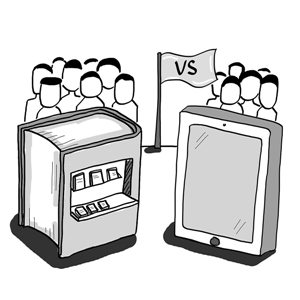A new chapter for bookshops
The Jifeng Bookstore, a landmark for Shanghai's book lovers, will close its flagship store at the bustling Shaanxi Road South metro station this month and move to the quieter Shanghai Library metro station where the rent is cheaper.
The once largest privately owned bookstore chain in Shanghai now has only two stores in the city, down from eight outlets at its peak.
Meanwhile, Popular Bookmall, another bookstore chain, has relocated its fourth-floor store in Metro City in Xujiahui upstairs to the fifth floor for a lower rent.
This is part of a global trend - escalating rents, the rise of online shopping, and people's changing reading habits - all of which contribute to the endangerment of traditional bookshops.
At this rate, it won't be long before Shanghai turns into another Hong Kong where most bookstores are tucked away on the second or third floors of old tenement buildings. These businesses cannot afford ground floor rents. Dubbed "upstairs bookstores," they account for the majority of bookstores in Hong Kong.
But, inevitable as this may seem, it is not necessarily a bad thing, as both Jifeng Bookstore and Popular Bookmall are adjusting their business strategies and actively responding to the market changes wrought by online commerce.
Jifeng, for example, will likely diversify into offering more product lines than just reading material. Popular Bookmall, meanwhile, plans to specifically target female readers.
They're on the right track. In an age when people can easily save up to 30 percent by buying books online, the only way for traditional bookstores to survive is to provide different experiences other than simple book purchasing. When it's a lifestyle being sold, people are always willing to pay more.
One case in point comes from the Popular Bookmall itself. The chain revamped its Fuzhou Road store last March and turned half of its floor space into a public reading space which also holds literary events. Now, 40 percent of the products sold are not books, but items such as coffee and stationery. After the revamp, sales increased despite the smaller selling space for books. People were more willing to visit because of the amenable ambience for reading, and it became something of a cultural hub for book lovers.
Another example is Taiwan's Eslite Bookstore which attracts customers with its modern interior design and spaciousness. I was in Hong Kong when it opened its first outlet there on the top three floors of a department store in a bustling, touristy spot. While local media doubted whether it would survive in Hong Kong, a place often dubbed a cultural desert, people crowded the store during the first few weeks after its opening, eager to buy books wrapped in an "Eslite" paper bag. The message was that it's not just the books that count, but also the brand and culture of the store in which they are sold.
The government, of course, can also help protect traditional bookstores, but they need to be careful in designing relevant policies, especially in being fair to unsubsidized businesses.
Germany is probably one of the few countries where traditional bookstores still thrive, thanks to a fixed, book-pricing policy which requires all booksellers to sell books at a price set by the publisher.
This means that neither big chain stores nor online retailers can offer large discounts. When the prices are the same, bookworms have no reason to favor online stores.
Writer Zhang Kangkang, a member of the National Committee of the Chinese People's Political Consultative Conference (CPPCC), proposed introducing a regulation on online book price during this year's CPPCC meeting to protect bookstores. However, for Chinese customers who are already well versed in buying discounted books online, this would mean higher prices. I doubt this would be practical in China.
